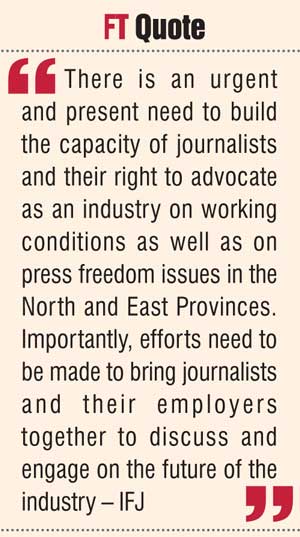Sunday Feb 22, 2026
Sunday Feb 22, 2026
Wednesday, 20 May 2015 00:00 - - {{hitsCtrl.values.hits}}
While noting that the new Government has made a number of important positive steps in its media reform agenda, several media organisations in Sri Lanka affiliated with the International Federation of Journalists have called for better working conditions for the country’s journalists.
The International Federation of Journalis ts (IFJ) and its affiliates, the Free Media Movement (FMM) and the Sri Lankan Working Journalists Association (SLWJA), have called for more dialogue and discussion on improving working conditions for journalists in Sri Lanka if the country is to rebuild a strong, robust and professional media industry in the country, IFJ said in a statement Monday.
ts (IFJ) and its affiliates, the Free Media Movement (FMM) and the Sri Lankan Working Journalists Association (SLWJA), have called for more dialogue and discussion on improving working conditions for journalists in Sri Lanka if the country is to rebuild a strong, robust and professional media industry in the country, IFJ said in a statement Monday.
The IFJ joined the International Media Assessment Mission to Sri Lanka from 8 to 14 May to follow-up on its recent assessments of media freedom situation since the 8 January presidential election. During discussions with Government officials, the Right to Information Act (RTI) was also vigorously discussed.
The media organisations highlighting some of the obstacles preventing journalists from joining and being active in unions said further support was needed for journalists in exile trying to return. They said further work was still urgently needed to ensure the media industry in Sri Lanka to grow and thrive.
“There is an urgent and present need to build the capacity of journalists and their right to advocate as an industry on working conditions as well as on press freedom issues in the North and East Provinces. Importantly, efforts need to be made to bring journalists and their employers together to discuss and engage on the future of the industry,” IFJ said.
FMM and SLWJA called for increased training opportunities to support professional and ethical journalism and improved understanding and dialogue with media employers on journalists’ right to form. The groups also highlighted the need for the long-awaited RTI Act.
The Government has overwhelmingly supported the RTI Act and provided the draft law to the mission. Prime Minister Ranil Wickremesinghe has told the mission that the Act would be presented following the general elections.
The IFJ endorsing the issues raised by its affiliates presented a number of recommendations in the mission statement.
The media group asked the Sri Lankan Government to create an independent Commission of Inquiry with a mandate and adequate powers to investigate past killings and disappearances of media workers, and threats and attacks on journalists, and media outlets and to ensure prosecution of those responsible and pay compensation to the victims and their families.
Prime Minister Ranil Wickremesinghe recently said the Government plans to set up a commission to probe the killings and disappearances of media personnel in the past.
They asked the media owners to recognise and support journalists’ and media workers’ right to form unions to negotiate and advocate on behalf of their members.
A broad, multi-stakeholder consultation should be held to identify needs in the area of professionalisation of journalists and media workers, and this should be followed up by a series of concrete actions to deliver on those needs, the IFJ suggested.
“The IFJ joins FMM and SLWJA in highlighting these issues and finding solutions for a stronger, more vibrant media industry in the country as the Government takes on its media reform agenda,” IFJ said.